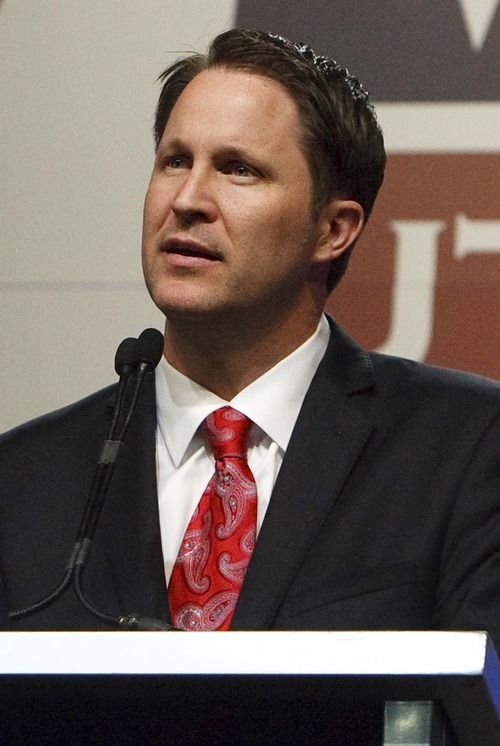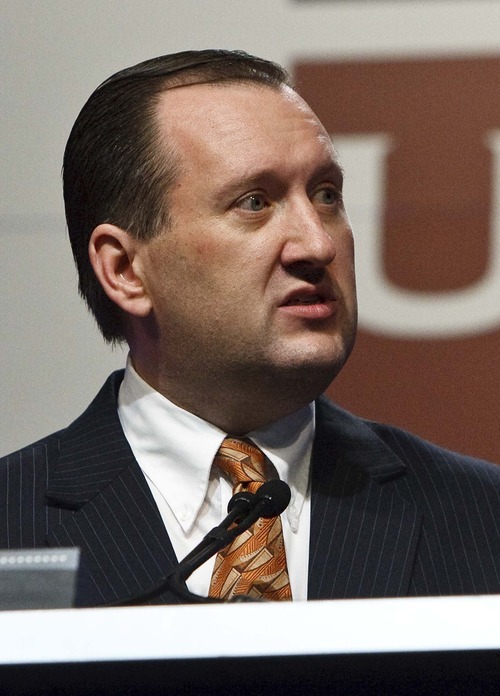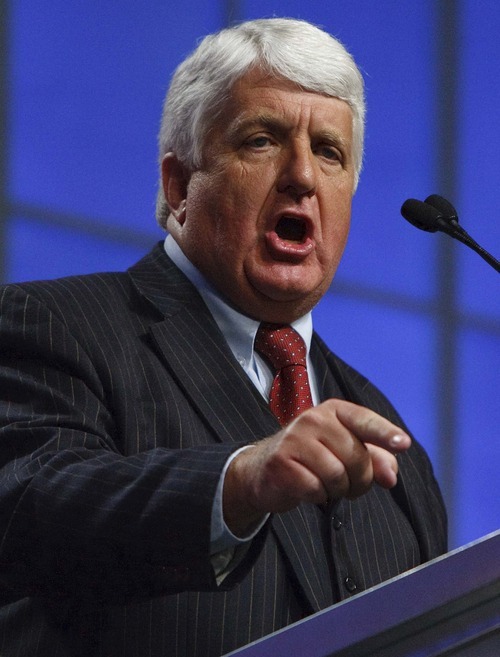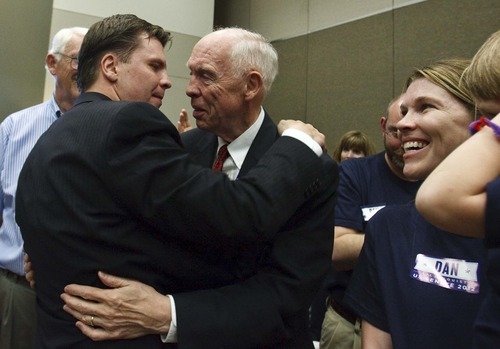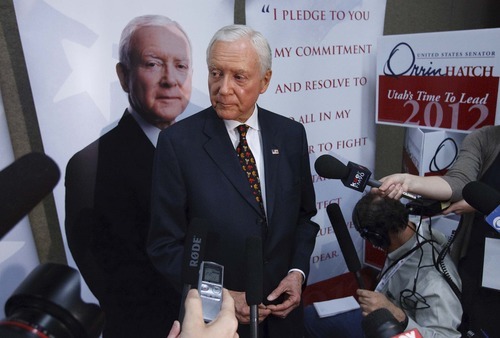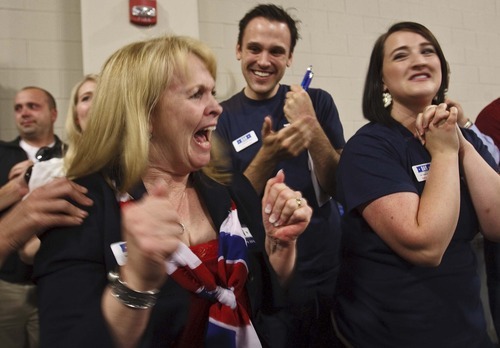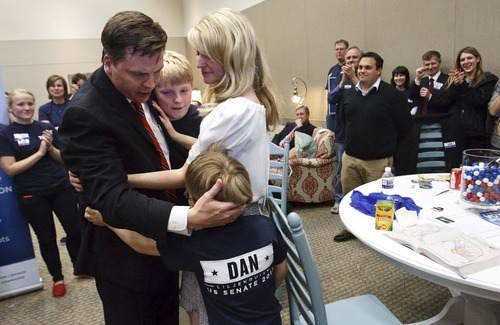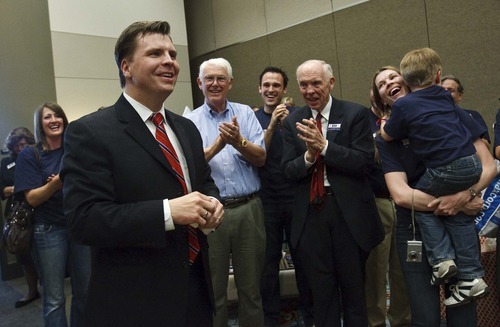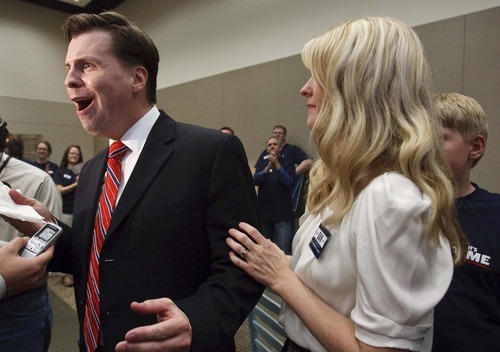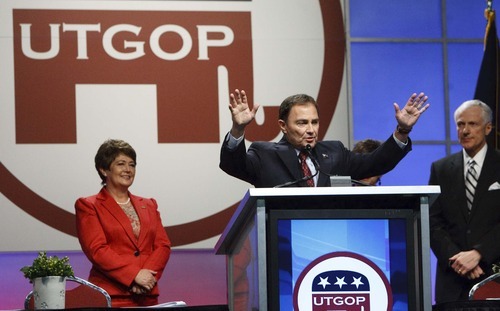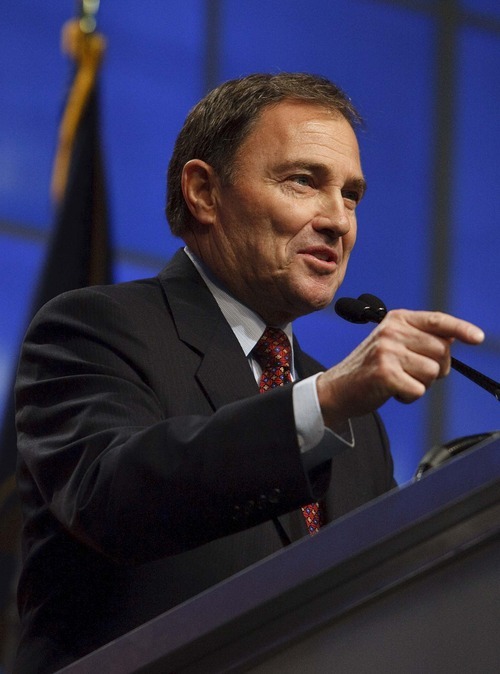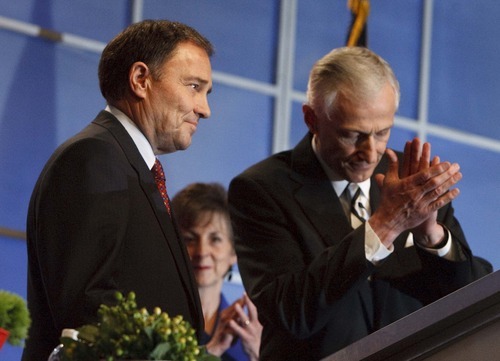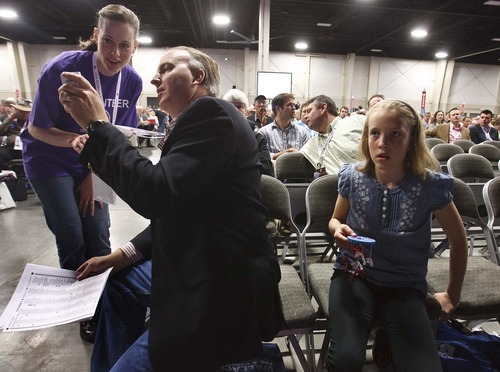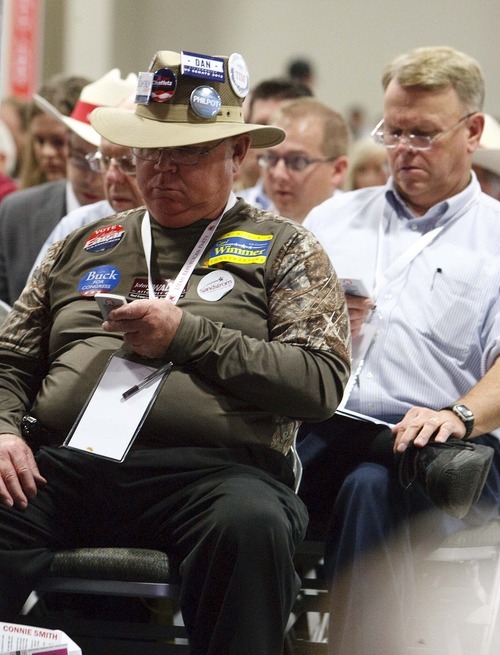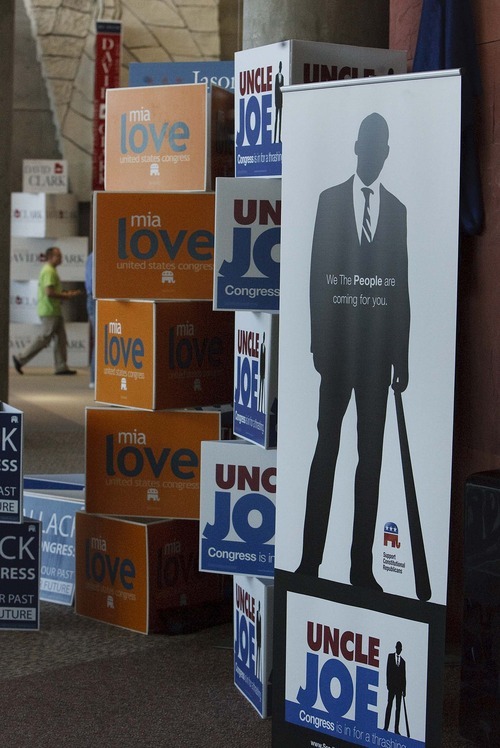This is an archived article that was published on sltrib.com in 2012, and information in the article may be outdated. It is provided only for personal research purposes and may not be reprinted.
Stewart wins 2nd District nod amid allegations, anger
Last-minute allegations of dirty tricks threw Utah's 2nd Congressional District Republican race into turmoil Saturday evening but businessman Chris Stewart emerged as the party's nominee over Utah's ex-House Speaker David Clark even after former rivals lined up behind Clark.
Eureka Mayor Milt Hanks alleged right before delegates began casting ballots that four contenders had conspired to drop negative information about Stewart — charges that those candidates denied and claimed was foul play by Stewart's camp.
"Chris Stewart is a bald-faced liar whether you like it or not," candidate Chuck Williams later alleged at the podium, prompting party officials to temporarily cut his microphone. Williams then withdrew and backed Clark.
Up next, Howard Wallack said that Hanks was a Stewart surrogate and throwing out allegations to gin up support for his friend.
"I know of only one campaign that made negative attacks on any candidates," Wallack said. "We have to take a long look at a candidate who never buys a booth, never makes a sign and all of sudden comes out with a vile attack."
In an interview, Wallack said the games have undermined Utah's caucus system.
"We believe there was a plant that was put into the race to put forth false accusations," Wallack said of Hanks. "I don't believe the caucus system can continue when [votes] are subject to manipulation like this."
Wallack said he and other candidates pulled out to try to keep Hanks' comments from giving Stewart the nomination. But Stewart later nabbed more than 60 percent of the vote to take the GOP nod. He will face Democrat Jay Seegmiller in November.
Hanks, who had raised little money in the race, had charged earlier that Clark, Williams, Wallack and Cherilyn Eagar tried to pull him into a plan to hit Stewart with negative attacks. Shortly after, a typewritten, unsigned note emerged tying Stewart the so-called "Temple mailer" that hurt ex-Sen. Bob Bennett two years ago because Stewart's brother, Tim, was found to be behind the piece. The piece also charged that Stewart embellished his military career.
"Are we back to the hog trough of backroom deals and backstabbing politics?" Hanks said.
Stewart said in an interview that the charges in the circulated note were offensive and degrades the political process. "It's just not true," he said.
Clark said he wanted to unite people, not divide people, but he also said he was disgusted by the late hit on his and his rivals' integrity.
"This has just been the opposite of what he alluded to," Clark said of Hanks' allegations. "I'm offended that the truth was not spoken."
State Rep. Greg Hughes, R-Draper, who supports Clark, said he has never seen anything like the ploy that he suspects Hanks and Stewart were part of.
"I smell a rat. I smell a rat a mile away," Hughes said. "It stinks to high heaven."
Delegates later voted to launch an investigation how the allegations came down.
— Thomas Burr and Robert Gehrke
tburr@sltrib.com
Love wins 4th District nomination
Mia Love pulled a major upset on Saturday, winning the Republican Party nomination in Utah's 4th Congressional District, advancing to face U.S. Rep. Jim Matheson in November.
"Today we have an opportunity to do something very special. Today we can start breaking a pattern," Love exhorted delegates before the final vote. "Today we can start bringing Jim Matheson home. Elect one nominee today, so we can take this fight to Jim Matheson tomorrow."
Love won 70.4 percent of the vote from the delegates while Wimmer captured 29.6 percent.
Wimmer, a co-founder of the Patrick Henry Caucus, focused on states rights, had campaigned for the office for more than a year, resigning his legislative seat to make his bid. He had broad legislative backing, the endorsement of Sen. Mike Lee, and the backing of legislators and Attorney General Mark Shurtleff.
But Love, the mayor of Saratoga Springs, had said coming into the convention that she was the front-runner.
With the endorsement of her competitors — former Rep. Stephen Sandstrom and attorney Jay Cobb — and the backing of Mitt Romney's son, Josh Romney, she managed to muster the 60 percent threshold needed to avoid a primary.
If elected to Congress, Love, the daughter of Haitian immigrants, would be the only black Republican woman in Congress.
Shurtleff, endorsing Wimmer before the final round of voting, urged delegates to back a proven conservative.
"You have to please pick a person with a proven record who can beat Jim Matheson this fall. Not a novelty," Shurtleff said.
The reference to Love as a "novelty" drew boos from many in the audience.
Love has already won support from Republican House leaders. House Majority Leader Eric Cantor, R-Va.; House Majority Whip Kevin McCarthy, R-Calif.; and Wisconsin Rep. Paul Ryan, the leading Republican budget hawk all gave money to Love early in her campaign.
— Robert GehrkeTwitter: @RobertGehrke
It's Love vs. Wimmer in second round of balloting
Saratoga Springs Mayor Mia Love and former state Rep. Carl Wimmer received the most votes on the first round of voting for the GOP nomination in the 4th Congressional District and will move to a head-to-head showdown.
Each argued they were the Republican candidate with the best shot at unseating six-term Democratic Rep. Jim Matheson in November.
Love received 53 percent of the delegate vote on the first ballot, Wimmer received 31 percent. If either candidate gets 60 percent on the final round of balloting, he or she will win the nomination. If not, they will advance to a primary.
Love said that Utahns don't believe that the federal government should run schools, control land, regulate business and require citizens to buy health care "by force." But Matheson, she said, didn't oppose federal encroachment in those areas.
"He betrayed our values," she said.
"The message of the Democrats is that the American dream is over. The government is all you have. Give up your dreams and the government will save you," she said. "We know here in Utah that none of that is true."
Wimmer said delegates asked him if he can beat Matheson.
"I believe that is the wrong question. The right question is can Jim Matheson beat me?" he said. "Jim Matheson and his liberal cronies in Washington don't understand one truth: There is nothing the American people will not sacrifice … to protect the American dream for our children and grandchildren."
Kenneth Gray, former state Rep. Stephen Sandstrom, and attorney Jay Cobb were eliminated in the first round of voting.
Sandstrom had pitched himself as a complete candidate, with experience as a Marine, a state legislator and business owner.
"I am the only candidate in this race with a full range of experience to deliver the results we need," Sandstrom said.
— Robert GehrkeTwitter: @RobertGehrke
Last-minute allegations in 2nd District
Second District Republican contender Milt Hanks threw out charges at the last minute before balloting on Saturday, alleging that four candidates conspired to oust rival Chris Stewart with some damaging information.
Hanks, the Eureka mayor, said hopefuls David Clark, Cherilyn Eagar, Howard Wallack and Chuck Williams came to him recently to say they had negative information on Stewart and that they all needed to band together to get rid of him.
"Are we back to the hog trough of backroom deals and backstabbing politics?" Hanks said. "I'm sorry if that's what Dave learned in the House. If that's what Howard learned in business, I don't need it. If that's what Cherilyn learned, I don't need it. If that's what Chuck learned, I don't need it."
The allegations brought some cheers by delegates, but left many of them a tad stunned.
Hanks said after his speech that his rivals came to him but didn't tell him what they had on Stewart. Shortly after, though, a typewritten note was circulated among delegates saying that Stewart had a hand in the two-year-old controversial "Temple mailer" that attacked ex-Sen. Bob Bennett and that Stewart was embellishing his military record.
"It's the same stuff I shoveled off the floor of the chicken coup," Hanks said.
Stewart said the charges in the circulated note were offensive and degrades the political process. "It's just not true," he said.
And those named by Hanks said they had no idea what he was talking about.
"This has just been the opposite of what he alluded to," Clark said. "I'm offended that the truth was not spoken."
The allegations surfaced only minutes before delegates headed to vote.
— Thomas Burr@thomaswburr
Chaffetz glides in nomination race
Rep. Jason Chaffetz claimed the GOP nomination in the 3rd Congressional District, with 75 percent of the delegate vote. He had two GOP rivals in Lynn Wardle and Brian Jenkins.
"It is a mess. It is an absolute mess in Washington, D.C.," said Chaffetz, who was first elected in 2008.
But he said he has had some successes, touting his legislation that would sell unused federal buildings and fire federal employees who are delinquent on their taxes. He noted that he sponsored the balanced budget amendment that passed in the House and touted his travels in support of presidential candidate Mitt Romney.
"Thank you for your support," he said. "I hope we made you proud."
— Matt Canham
Paper ballots in 2nd District
Delegates in Utah's 2nd Congressional District were faced with the choice of 11 candidates at the Utah Republican Convention, too many for the party's new fancy electronic voting machine that only had 10 buttons.
So delegates had to get out of their seats and head to another hall where a whole new podium, speakers, projectors, TelePrompTers and seats awaited them. After the speeches, the delegates will have to vote on paper and wait for volunteer judges to count them up.
But it wasn't necessary after all.
Candidate Ed Mayorhofer filed for office but didn't show up to Saturday's convention, leaving the field with only 10 candidates, the perfect number to have used the electronic voting system.
Alas, it was too late to change things for the GOP and so now it's on to the paper ballots.
— Thomas Burr@thomaswburr
Bishop scores easy win
Rep. Rob Bishop cruised to the nomination in the 1st Congressional District, overtaking two opponents.
He took 81 percent of the delegate vote, well over the 60 percent threshold needed to secure the nomination, beating tea party leader Jacqueline Smith and Leonard Fabiano.
Bishop touted his positions on the Western Caucus, the 10th Amendment Task Force and the House subcommittee on public lands and he said he did so without seeking public attention.
"I do it the old fashion way back there," he said. "When I speak I do it with a reason, when I vote I do it with a purpose."
He also threw in a few jokes, saying when first elected to the U.S. House in 2000 he promised not to change.
"Apparently that meant I would stay short, fat and gray."
— Matt Canham
Primary in auditor's race
There will be a primary for state auditor between Auston Johnson, who has held the office since 1995, and state Rep. John Dougall.
Dougall, R-Highland, was running with the backing of leaders of the state Legislature, who said that the State Auditor, under Johnson's watch, had not met its constitutional duty as a watchdog.
Johnson, who did not have a Republican challenger in the last two elections, came out ahead in the balloting, winning 55 percent of the delegate support to Dougall's 45 percent, but he fell short of the 60 percent threshold needed to win the nomination outright.
The two will face off in a June 26 primary election.
— Robert GehrkeTwitter: @RobertGehrke
Herbert wins nomination: updated
Utah Gov. Gary Herbert beat back a challenge from five Republican contenders to win his party's nomination Saturday.
Herbert won 63 percent of the vote from the Republican delegates, defeating Morgan Philpot, a former state representative who narrowly lost to U.S. Rep. Jim Matheson in 2010.
Herbert will face Democrat Peter Cooke, a retired two-start general, who received the Democratic nomination at his party's convention.
"I know Peter Cooke. He's a good guy," Herbert said. "I like Peter. We'll have a spirited contest."
Philpot said he was surprised and disappointed that fellow challenger David Kirkham, a co-founder of the tea party and maker of custom sports cars, decided to throw his support behind Herbert after he was eliminated on the first ballot.
"I think the Kirkham endorsement of the governor made the difference at the end," Philpot said. "I'd always thought that the candidates in the race were all pretty much 'Anybody But The Governor.'"
"David and I actually became good friends on the campaign trail," Herbert said, adding that they planned to get lunch within the next few weeks and give the governor a chance to drive one of Kirkham's custom roadsters.
Kirkham had criticized the governor, as well, saying that "If things are not bad [in Utah] is it because of or in spite of our governor."
But in the end, Kirkham said he has never had personal issues with Herbert and said of his nomination: "It was the right thing to do."
"The people spoke and … I'm in favor of what the people are in favor of," Kirkham said.
Challengers Ken Sumsion, a state representative; William Skokos, an energy entrepreneur; and Lane Ronnow were also eliminated in the first round of balloting.
Herbert touted his accomplishments since he became governor in 2009, when then-Gov. Jon Huntsman became the U.S. Ambassador to China.
"You've heard a lot of talk about leadership, might I humbly suggest that true leadership is about much more than inflammatory rhetoric or shallow soundbites," Herbert said.
Philpot argued that the governor had shown a lack of leadership, and urged delegates to send the race to a June primary.
"Let's air this to the public," Philpot said. "We cannot continue to be conned by promises of politicians who do not deliver when they have the chance."
The governor argued that he has reduced taxes, slashed regulations and, as a result, the Utah economy has added jobs at twice the national rate.
"California and virtually every other state … wishes they were doing as well as Utah," Herbert said.
His Republican opponents criticized him for not showing adequate leadership and failing to stand up to the federal government.
Philpot's biggest applause came when he criticized the governor for participating in the Common Core standards, "destroying right now a 100-year-plus tradition of maintaining sovereignty and control over Utah's education."
Sumsion said he would refuse to take federal education dollars and reject the federal No Child Left Behind program.
Herbert countered that he has fought for local control in education and parental choice, saying he vetoed a bill that would have restricted sex education in schools because it infringed on parents' choices.
"I don't just talk about parental control. I stand up for it," Herbert said.
— Robert Gehrke and Matt CanhamTwitter: @RobertGehrke
Democrats nominate Howell
Scott Howell , a former state senator from Olympus Cove, avoided a primary in his contest Saturday for the Democratic nomination for U.S. Senate.
Pete Ashdown lost to Howell in a tight race that most seemed to agree would be a primary fight.
Howell, who received 63 percent of the vote in the first ballot of 2,537 convention delegates, said Utah voters would not get swept up in the strong support for likely GOP presidential nominee Mitt Romney and overlook Democrats running in their state Nov. 6.
"Voters in Utah are not cheap," he said. "They will vote for the individual."
Democrats in the 1st Congressional District will, however, have a primary to vote in. Candidate Donna McAleer won 50.75 percent of the vote, forcing a June 26 and Ryan Combe.
— Judy Fahys
Twitter: @Judyfutah
Herbert wins nomination
Utah Gov. Gary Herbert beat back a challenge from five Republican contenders to win his party's nomination Saturday.
Herbert won 63 percent of the vote from the Republican delegates, defeating Morgan Philpot, a former state representative who narrowly lost to U.S. Rep. Jim Matheson in 2010.
Herbert will face Democrat Peter Cooke, a retired two-start general, who received the Democratic nomination at his party's convention.
Herbert touted his accomplishments since he became governor in 2009, when then-Gov. Jon Huntsman became the U.S. Ambassador to China.
"You've heard a lot of talk about leadership, might I humbly suggest that true leadership is about much more than inflammatory rhetoric or shallow soundbites," Herbert said.
Philpot argued that the governor had shown a lack of leadership, and urged delegates to send the race to a June primary.
"Let's air this to the public," Philpot said. "We cannot continue to be conned by promises of politicians who do not deliver when they have the chance."
The governor argued that he has reduced taxes, slashed regulations and, as a result, the Utah economy has added jobs at twice the national rate.
"California and virtually every other state … wishes they were doing as well as Utah," Herbert said.His Republican opponents criticized him for not showing adequate leadership and failing to stand up to the federal government.
Herbert was endorsed in the second round of voting by David Kirkham, a co-founder of Utah's tea party and manufacturer of custom sports cars, who finished third in the first round of voting with 9 percent of the vote.
Kirkham had criticized the governor, as well, saying that "If things are not bad [in Utah] is it because of or in spite of our governor."
Challengers Ken Sumsion, a state representative; William Skokos, an energy entrepreneur; and Lane Ronnow were eliminated in the first round of balloting.
Philpot's biggest applause came when he criticized the governor for participating in the Common Core standards, "destroying right now a 100-year-plus tradition of maintaining sovereignty and control over Utah's education."
Herbert countered that he has fought for local control in education and parental choice, saying he vetoed a bill that would have restricted sex education in schools because it infringed on parents' choices.
"I don't just talk about parental control. I stand up for it," Herbert said.
— Robert Gehrke
Twitter: @RobertGehrke
Primary in A.G.'s race
Utah attorney general candidates Sean Reyes and John Swallow will face off in a June primary for the Republican nomination after neither met the 60 percent threshold they needed to win the nomination outright.
Both are seeking to replace Attorney General Mark Shurtleff, who is not seeking a third term, and the winner of the June 26 primary will run against Democrat Dee Smith in November.
Swallow, who had the backing of Shurtleff, received 54.5 percent of the vote to Reyes' 45.5 percent, throwing the contest to Republican primary voters.
Swallow argued that he had taken charge of the state's lawsuit against the federal government over the Democrats' health care law, a point that has been questioned by critics. Nonetheless, Swallow said his experience was key.
"I've learned how to fight and how to win, in the courtroom, in the Legislature and in the Attorney General's Office," Swallow said, adding that the attorney general was "not just a job for a lawyer, it's a job for a leader."
Reyes countered that he as the most qualified, noting his partnership in the state's largest law firm and time arguing before the state's highest court.
"I've had 15 years of experience winning cases in the courtroom," Reyes said. He said the attorney general was "not just someone who says he will fight or takes credit for a fight, but someone who has consistently fought."
— Thomas Burr@thomaswburr
What a difference two years make
In 2010, Utah Republican delegates bounced Sen. Bob Bennett from office with chants of "TARP, TARP, TARP," referring to the Wall Street bailout that Bennett voted for.
On Saturday, with a slew of new delegates in the room, Bennett returned to the convention and received a standing ovation by a good swath of delegates when he received the GOP chairman's award for outstanding service.
"Senator Bennett we were proud of the service you gave this great state," Chairman Thomas Wright said.
The crowd applauded again and several starting shouting for Bennett to speak. He returned to the podium and spoke to the delegates for the first time since he lost re-election.
"I simply want to thank you for the opportunity of serving the people of Utah," Bennett said. "I had a wonderful ride. I had a great time. I loved the Senate. I also, would like to report to you, having a great time now. I have not retired."
Bennett also noted that he's pretty happy with his new role in consulting, academia and speaking.
"I appreciate the freedom that comes from not asking Harry Reid permission to leave town," Bennett said.
— Thomas Burr
@thomaswburr
Herbert, Philpot go head-to-head
Utah Gov. Gary Herbert was forced to a second ballot Saturday against challenger Morgan Philpot.
Herbert received 57 percent of the vote on the first ballot while Philpot received 23 percent of the vote. Four other candidates were dropped off the second-round ballot. If one candidate receives 60 percent of the vote, he will win the party's nomination outright.
In his speech before the second round of voting, Philpot urged delegates to send the race to a primary.
"Let's air this to the public," Philpot said. "We cannot continue to be conned by promises of politicians who do not deliver when they have the chance."
During his speech, Herbert touted his accomplishments since he became governor in 2009, when then-Gov. Jon Huntsman became the U.S. Ambassador to China.
"You've heard a lot of talk about leadership, might I humbly suggest that true leadership is about much more than inflammatory rhetoric or shallow soundbites," Herbert said.
The governor argued that he has reduced taxes, slashed regulations and, as a result, the Utah economy has added jobs at twice the national rate.
"California and virtually every other state … wishes they were doing as well as Utah," Herbert said.
His Republican opponents criticized him for not showing adequate leadership and failing to stand up to the federal government.
Herbert was endorsed in the second round of voting by David Kirkham, a co-founder of Utah's tea party and manufacturer of custom sports cars, who finished third in the first round of voting with 9 percent of the vote.
The party's nominee will face Peter Cooke, a retired two-star general and businessman, who received the Democratic nomination at the party's convention Saturday morning.
— Robert GehrkeTwitter: @RobertGehrke
Delegates: Electronic voting rocks
Utah Republicans had become accustomed to long, drawn-out conventions as volunteer judges count stacks of paper ballots do decide which candidates get nominated and which ones head to a primary.
Not Saturday.
Despite some initial objections, delegates seem to find the new, electronic voting system a big positive in streamlining and speeding up the voting process and bringing results back within minutes, not hours.
The first round of the Senate balloting came back so fast, that delegates seemed almost stunned.
"I couldn't be more thrilled with it," Utah GOP Chairman Thomas Wright told us during the first round of votes for governor. "I'm glad to have led the initiative to bring the Utah Republican Party into the 21st Century."
As Wright was explaining how well he thought the voting was going, he's interrupted by a delegate thanking him for the e-voting on behalf of her entire section.
"People are casting their votes; people are confident they're being counted," Wright said.
— Thomas Burr @thomaswburr
Hatch goes to primary
Sen. Orrin Hatch came up just short of the support needed to claim his party's nomination for the seventh time, forcing him into a primary election with state Sen. Dan Liljenquist in June.
After two rounds of balloting, Hatch had the support of 59.1 percent, a handful of votes short of the 60 percent threshold to claim the nomination outright.
He'll face his first primary election since his 1976 victory.
Eight other challengers were eliminated on the first round of balloting at Sandy's South Town Expo Center.
In that first round all but three of the delegates in attendance voted using the new push button system to make their preference known.
Among them was Ken Wood of Taylorsville, who said he supported Hatch.
"I do think seniority matters. I'm for term limits but until we do it nationally, why should we hurt Utah," he said.Lorine Taylor of Kearns went for Liljenquist saying: "Hatch has done a good job but I think it's time for someone new."
Hatch started his speech with a video message from Mitt Romney, who apologized for not attending in person.
"We need Orrin hatch back in the Senate helping to lead the way," Romney said before Hatch took the stage.
With a feisty demeanor and a hoarse voice, Hatch called himself "a tough old bird" and promised that this would be his last election.
"It will be my last six years in the U.S. Senate," he said. "But they'll be the best six years and the most critical six years of all."
He didn't reference any of his challengers, instead focusing on his seniority on the Senate Finance Committee, where he has the chance to be the chairman if his party wins a majority in November.
Liljenquist, on the other hand, took direct aim at Hatch, arguing: "No senator is king, no matter what seat he is in."He promised that he wouldn't move to Washington, would support term limits and try to eliminate congressional pensions. He ended his speech by mentioning the plane crash he survived before getting involved in politics.
"It stamped on my mind a sense of urgency I did not feel before, but I feel now," he said.—Matt Canham and Thomas Burr
mcanham@sltrib.comTwitter: @mattcanhamThomas Burr contributed to this report.
Hatch, Liljenquist survive first round
After the first round of Senate balloting, eight candidates were eliminated, leaving only incumbent Sen. Orrin Hatch and former state Sen. Dan Liljenquist.
Hatch almost hit 60 percent in the first round claiming more than 2,200 votes and 57.3 percent. Liljenquist came in a distant second with 28.3 percent.
A second round of balloting will commence after the candidates have another chance to speak to the crowd at Sandy's South Towne Expo Center.
In that first round all but three of the delegates in attendance voted using the new push button system to make their preference known.
Among them was Ken Wood of Taylorsville, who said he supported Hatch.
"I do think seniority matters. I'm for term limits but until we do it nationally, why should we hurt Utah," he said.Lorine Taylor of Kearns went for Liljenquist saying: "Hatch has done a good job but I think it's time for someone new."
Hatch started his speech with a video message from Mitt Romney, who apologized for not attending in person.
"We need Orrin hatch back in the Senate helping to lead the way," Romney said before Hatch took the stage. With a feisty demeanor and a hoarse voice, Hatch called himself "a tough old bird" and promised that this would be his last election.
"It will be my last six years in the U.S. Senate," he said. "But they'll be the best six years and the most critical six years of all."
He didn't reference any of his challengers, instead focusing on his seniority on the Senate Finance Committee, where he has the chance to be the chairman if his party wins a majority in November.
Liljenquist, on the other hand, took direct aim at Hatch, arguing: "No senator is king, no matter what seat he is in."
He promised that he wouldn't move to Washington, would support term limits and try to eliminate congressional pensions. He ended his speech by mentioning the plane crash he survived before getting involved in politics.
"It stamped on my mind a sense of urgency I did not feel before, but I feel now," he said.
—Matt Canham and Thomas Burr
mcanham@sltrib.comTwitter: @mattcanhamThomas Burr contributed to this report.
A Convention oops...
The Republican convention has had a few minor snags, most of which surround the electronic balloting. But this might be the most embarrassing one. One of the Utah County signs has a slight problem.
— Matt Canham
Bramble avoids primary, Okerlund doesn't
Utah Sen. Curt Bramble survived a challenge from Brigham Young University professor Andrew Holmes, capturing the Republican nomination in the Provo district Saturday.
Bramble received just enough votes to clear the 60 percent threshold needed to win the nomination at the Utah Republican Convention, avoiding a June primary.
In other Senate races, state Sen. Ralph Okerlund, R-Monroe, narrowly missed winning the nomination outright over state Rep. Patrick Painter, R-Nephi, capturing 59.8 percent of the vote. The two lawmakers will face off in a June primary.
State Sen. Casey Anderson, R-Cedar City, will also have a primary with state Rep. Evan Vickers, R-Cedar City, in the sprawling southern Utah senate district. Anderson win 57 percent of the vote and Vickers received 43 percent.
State Sens. Allen Christensen of Ogden, Todd Weiler of Woods Cross, and David Hinkins of Orangeville all avoided primaries by winning more than 60 percent in their respective districts.
— Robert Gehrke Twitter: @RoberGehrke
Romney for Romney at the Gop Convention
Mitt Romney's son Josh played surrogate for his dad on Saturday at the Utah Republican Convention, pitching his the presumptive Republican presidential nominee to a crowd that doesn't need much pitching.
"Utah obviously holds a very special place in my heart," Josh Romney said, leading off the convention. "He talks about Utah all the time on the campaign trail."
The Romney son noted that his dad lauds Olympic volunteers often and asked the crowd to raise their hands if they were among the thousands of Utahns who helped out. A scattering of hands shot up.
Josh Romney, who has now been to 20 states urging voters to back his father, also asked the crowd to support a Romney slate of national delegates - including Josh himself - for the Tampa national convention. The group includes state lawmakers, Rep. Rob Bishop, various well-known Utah GOPers and congressional hopeful Mia Love.
Josh Romney also harkened back to the line President Barack Obama said that if he couldn't turn around the economy in three years, he would be a one-term president.
"Mr. President we're here to collect," Josh Romney said.
— Thomas Burr@thomaswburr
GOP, Dems to pick candidates. Will Hatch escape a primary? Love or Wimmer?
Happy Saturday and welcome to our special convention edition of Political Cornflakes. Today's dual (or perhaps, dueling) conventions will winnow the field of candidates after a hard-fought slog by a slew of incumbent and wannabe incumbents. Exciting eh?The crack Salt Lake Tribune political team will provide as-its-happening updates throughout the day on various platforms (from Twitter to Storify to blogs and web stories), so please stay tuned to sltrib.com for the latest.
-> Follow our regular updates on the Political Cornflakes blog. [Trib]
What to look for: The top questions that (we hope) will be answered by day's end:-> Can Sen. Orrin Hatch nab the Republican nomination outright or find himself facing off with former Sen. Dan Liljenquist on June 26?-> Will Saratoga Springs Mayor Mia Love and former state Rep. Carl Wimmer end up battling it out? Or is there a dark-horse candidate who will come from behind?-> What reception does Rep. Jim Matheson receive this year as compared to the not-so-welcoming convention two years ago?-> Can Pete Ashdown return as a Democratic nominee or get pushed aside by former state Rep. Scott Howell?-> Who comes out of the crowded 2nd Congressional Republican field?-> Will the GOP delegates opt for electronic voting or will we still be at the conventions Sunday afternoon?
Tweet, tweet: Don't forget to track our Twitter feeds and the hashtags #utgop and #utdem.
-> At the GOP convention: @RobertGehrke, @thomaswburr, @mattcanham-> And over at the Democrats huddle: Judy Fahys — @judyfutah
The GOP: The South Town Exposition Center in Sandy is the place to be for Republicans today, as 4,000 delegates will decide — or at least thin the field — in several races, including for U.S. Senate, four House races, governor, attorney general, auditor and more.
-> The schedule: 7:30 a.m. for multi-county state House breakouts; 8:30 a.m. for multi-county state Senate breakouts; 10 a.m. Call to Order. In order: Senate, governor, attorney general, auditor, 2nd District (breakout, Hall 5); 1st District; 3rd District; 4th District. A full list: [PDF].
-> Livestream, courtesy of the Utah GOP: [UStream]
The Dems: The 3,000 delegates from Utah's minority party are meeting at the spacious Salt Palace, and those traveling to the heart of Salt Lake City may want to use public transit, because the Salt Lake City Marathon is taking place today. Here's the route for those who are interested. [Trib]
-> Registration begins at 7:30 a.m., the speeches start at 11 a.m. and the first round of voting kicks off at 12:30 p.m. Here's the detailed schedule: [UTDems].
-> There will be no webcast, but you can follow the party's official Twitter feed at @UtahDemocrats.
-> Unsung heros: The Utah Democrats have created two awards to honor hard-working party activists and they are named after two giants in the party who have passed away in recent years. The Ed Mayne award went to Judy Barnett with the Utah ALF-CIO, while Ellen Davis, a retired teacher, received the Todd Taylor award.
Got a tip? A birthday, wedding or anniversary to announce? Email us at cornflakes@sltrib.com. To sign up for our weekday email, click here: [Trib].
— Thomas Burr and Matt CanhamTwitter.com/thomaswburr and Twitter.com/mattcanham


